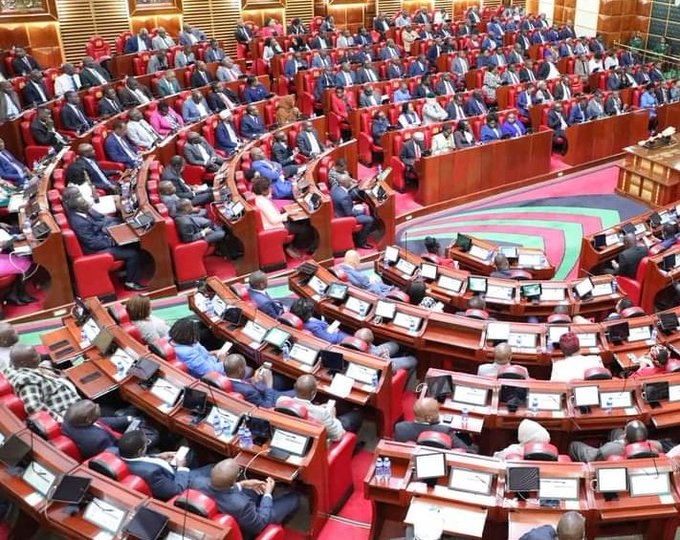The Nairobi county has recorded a Sh250.1 million rise in its internal revenue for the first two months of July and August this financial year.
Data from the county’s finance department shows that City Hall raised Sh1.07 billion in the period under review, reflecting a rise from Sh823.1 million last Financial Year 2022-2023.
For July and August 2023, Sh572.87 million and Sh501.03 million was collected respectively.
This was a major improvement compared to Sh481.27 million and Sh341.74 million collected in the same months in the last financial year.
All the internal revenue streams increased but markets, billboards and advertisements, and building permits took a hit and dropped in the period under review.
In July and August last year, Sh114.13 million was collected from land rates, parking fees (Sh256.29 million), single business permits (Sh41.08 million), building permits (Sh186.87 million) while Sh71.32 million was collected from billboards and advertisements
From house rent City Hall collected Sh49.04 million, fire inspection certificates (Sh4.14 million), food handlers certificates (Sh10.66 million), markets (Sh33.88 million) and other income amounted to Sh55.58 million.
In the current Financial Year 2023-2024, for July and August the Governor Johnson Sakaja administration collected Sh 143.74 million from land rates, parking fees (Sh288.56 million), single business permits (Sh117 million), building permits (Sh176.65 million) and Sh52.74 million was collected from billboards and advertisements.
From fire inspection certificates City Hall managed to collect Sh12.69 million, food handlers certificates (Sh15.75 million), markets (Sh30.1 million) and other income Sh162.66 million.
Nairobi has for years grappled with weak revenue collection systems and corrupt officials who continue to deny the county millions of shillings in daily revenue, undermining efforts to boost own source revenue.
Explaining why billboards and building permits recorded a drop, Finance executive Charles Kerich told the Star that the figures excluded those payments done through cheques that have not been issued with receipts.
“Once the receipting is done the numbers will go up though still below the target,” he said.
Kerich also noted that the increase in revenue from rates is due to the implementation of the new valuation roll, bulk SMS reminders to those issued with bills, and serving of demand notices through the subcounty officers.
For the single business permits, the Finance boss said that they started sending bulk SMS to all approved applications.
“This spurred payment. We also pushed continuous registrations in all subcounties,” Kerich added.
For parking revenue, the CEC highlighted that City Hall followed up on Saccos monthly bills, and conducted some operations on daily parking by clamping all non-compliant vehicles. This boosted compliance.
On house rent, Kerich revealed that the county did a lot of follow-up on monthly bills ensuring payments.
“This is a fixed payment that is possible to fully enforce,” he said. For fire and health certificates the CEC stated that City Hall had continuous operations in the subcounties, system reminders/expired licenses and follow-up to ensure clients were up to date with their payments.
Nairobi MCAs passed Sakaja's first budget of Sh42.3 billion which is the highest ever since devolution comprising Sh28.3 billion for recurrent and Sh14 billion for development expenditures.
It is an increase from Sh39.63 billion for the Financial Year 2022-2023.
Sakaja aims to collect Sh19.9 billion own source revenue in the Financial Year 2023-24.
In the last FY 2022-23 , Nairobi's own source revenue hit Sh10.6 billion.
Despite being way below the target of Sh18.2 billion, it is the highest achieved by City Hall in the last five years.
In this FY 2023-24 the Sakaja administration aims to collect Sh19.9 billion own source revenue as part of the Sh40.7 billion budget.
Sakaja plans to introduce hourly parking charges in the next financial year as part of initiatives to increase revenue.
If the plan is adopted, motorists in the CBD will pay Sh100 for the first hour of parking.
Those who intend to stay longer will pay Sh50 for the subsequent hours they park in the City Centre.
Currently, motorists pay Sh200 daily for on-street and lot parking of small vehicles in and outside the CBD.
To boost Nairobi’s revenue collection, Sakaja’s administration is setting up a revenue agency that will be tasked with collecting all rates, fees and charges.
The Nairobi City County Revenue Administration Authority will be headed by a board, while the management will be under a chief executive officer, who will be the principal collector of revenue.














